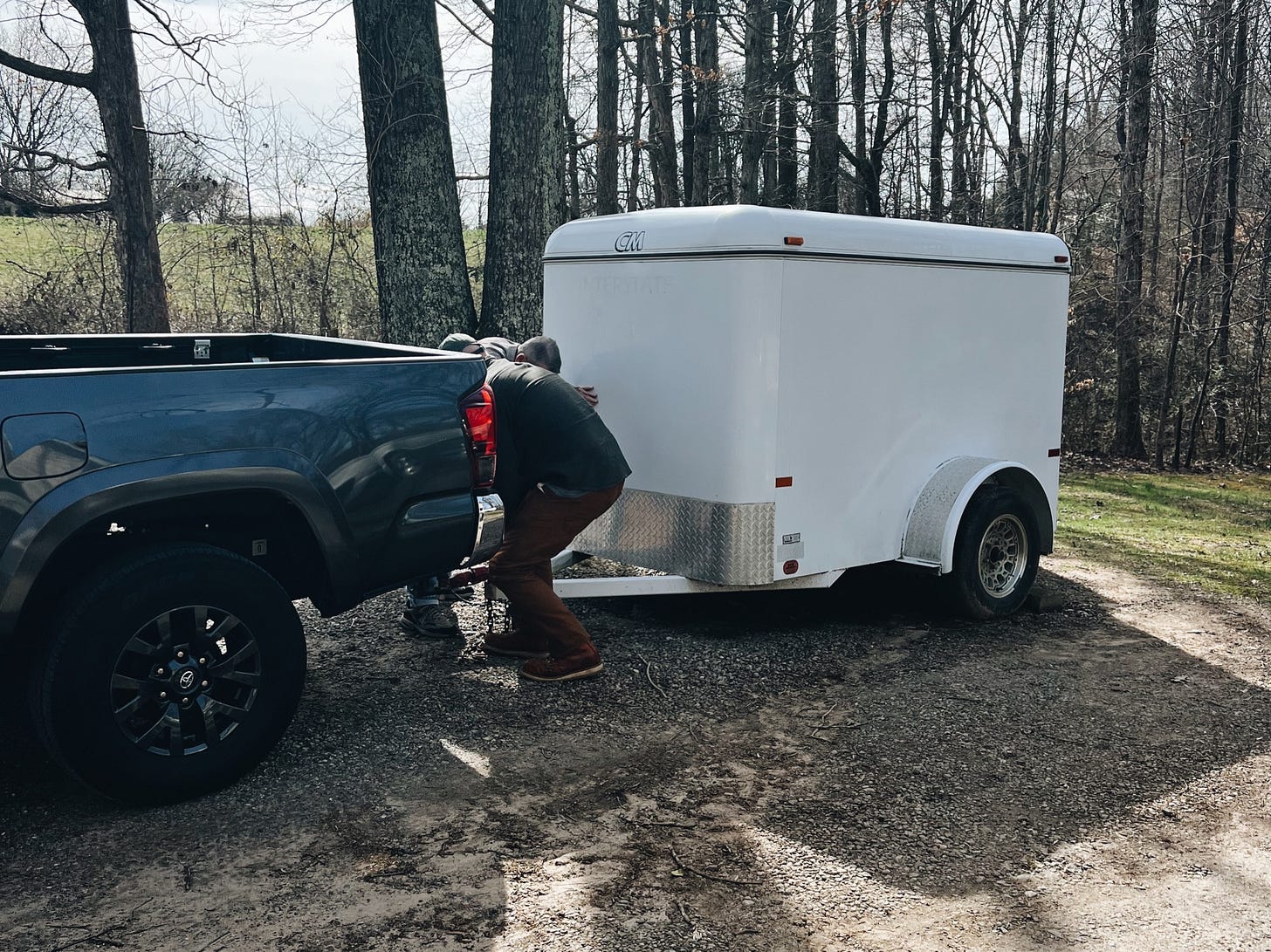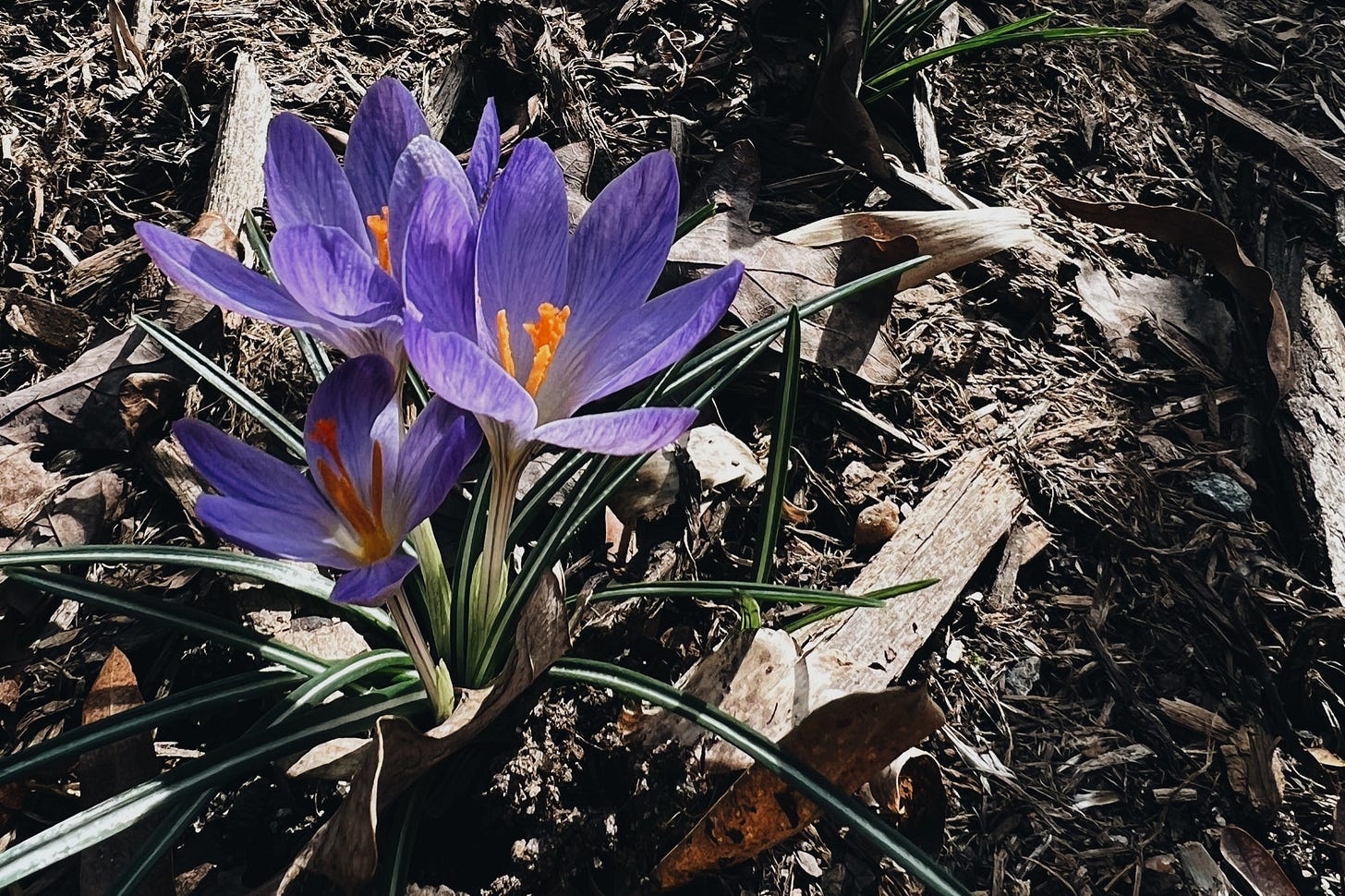☀️ how to not use the wrong frost dates ❄️
& my new CUT FLOWER garden calendar just released!!
TWO BIG NEWSES 🥳
🚛 BIG NEWS / plz welcome the newest member of the little floricult team! we got a 5x8 trailer to tote around town for all our garden installation projects and it feels very grown up!
🌸 BIGGER NEWS / the cut flower version of my dynamic veggie calendar was just released!!! thank you everyone for waiting so patiently. you can get the cut flower calendar here, or the bundle with both here. this calendar automatically builds your spring, summer, & fall-sown schedules based on your frost dates - and also has a schedule for purchasing/planting/bloom dates for spring and summer bulbs.
🧹 HOUSEKEEPING 🧹
📚 new readers! here are some important newsletters to catch up on!
📆 upcoming events: march 1st, 7pm est - monthly virtual garden club
❄️ FROST DATES ❄️
When I started gardening again as an adult, I thought a frost date was a single magical day of the year when you could begin to garden.
It was the “real” beginning of Spring, and everything was perfect and warm after that day. This “last spring frost” and the “first fall frost” were the same every year, based on my location, and everyone agreed on it.
The truth is that nature cannot be tamed, and humans simply observe weather patterns and try to calculate probabilities based on hundreds of years of recorded days.
Every year, our last and first frost happens at a different time, and we gardeners and farmers try our hand at our crystal ball, attempting to make a better decision than the year before. We look for clues from nature and reconsider old wives tales, because often the earth knows what’s coming before we do. Are the bluebirds nesting yet? Is sap flowing in the maple branch? Are the leaves turning already? How many acorns were there?
THERE ARE MULTIPLE CHOICES
Since sharing my dynamic garden calendar with the world, I have been emailing & DM’ing with dozens of gardeners around the country about frost dates, and realizing (panicking) that most of us are not using the ones we’d prefer.
If you are noticing that Farmers Almanac, your local extension office, and local farmers are all providing different frost dates, this is why: Frost dates are calculated on a probability spectrum, and people/organizations have different preferences for risk tolerance.
The best way to choose your dates is via DavesGarden.com. Inputting your zip code will generate a chart like this:
The top row shows you the % likelihood that it will drop below 32° after that date. For example — On the far right of the top row, there is a 90% chance it will drop below freezing after April 3rd. On the left, there is only a 10% change it will drop below freezing after May 7. That is a big range.
Now compare this to the dates the Farmers Almanac and my extension office give me, and even the difference that FA provides when inputting my city vs my zip code:
SO WHICH DO YOU CHOOSE?
For my last spring frost, my riskiest date is April 3 (90%) and my safest is May 7 (10%)— with FA/Extension telling me April 1st, 2nd, and 15th.
If your priority this year is low maintenance, choose your 10% number, or a week after it. This will eliminate the need for frost cover strategy, but likely put emphasis on your garden being predominantly warm season crops because your “safe” cool season window will be short.
If your priority is nominal maintenance with an interest in learning, choose 30% and invest in frost covers that you’re ready to set out over cool crops when a frost hits. This will allow you to grow a few cool season crops, protecting them down to 26-28°.
If your priority is necessary maintenance with a focus on developing farming/homesteading skills, choose 50-60% and buy heavy-duty Agribon cloth [AG-50 or AG-70] that provides 6-8°+ of insulation or build cold frames. This will allow you to fully maximize cool season crops!
SOOO WHAT IS LAUREN DOING?
Personally, I am going for 20% this year and selecting May 1 — even though I am well prepared with row covers/frost cloths. I worked on April 15 last year and it was mostly fine, but our crippling drop to 19° in late April really hurt some things, and some of my indoor seeds were forced to stay in their lil pots too long.
This is what my spring calendar looks like, and this is also why I built a dynamic calendar that automatically shifts by just typing in a frost date. I change my schedule every year, and if we get to April 20th & there is no frost in sight for the next 10 days, I will immediately up my date to April 20th and my entire year will be replanned. ✨
You will notice I am taking the opposite strategy for my fall frost date by choosing October 24th (70%). This is because my cool season crops are more resilient to a frost at the end of their season, than in the spring when they are itty bitty babies. I also am more likely to set out frost protection towards the end of the year, and in the summer, it’s just easier to pretend the heat will be around forever.
PS. I’m in Winston-Salem, NC.
(: DISCLAIMER :)
The weather is out here wildin’ lately. I haven’t been farming for my entire life in the same place. Each year is a work in progress. I blend my book smarts with my experience, my instinct, and a little bit of play.
I have a hard time advising people on frost dates, because it feels like a promise on mother nature’s behalf, and she is more out of balance than ever before.
My hope with this newsletter, as ever, is to share what I learn and do my part on our collective path to becoming humans who are re-learning the language of the earth and the living things around us.
There is no safety in farming and there never has been. It is dangerously optimistic work, and takes you for the highest highs and lowest lows.
Gardening has brought me physical pain, rage, embarrassment, despair — but it has also brought me home.
We belong to the earth more than it belongs to us, and our rewards for remaining connected to it are many — and more than the fruit we harvest.
Keep your shoes off, let the dirt ground you (both literally and metaphorically). Work with your hands. Relieve your body from sitting. Stand, sit, struggle, and study the small things. Remember what it was like to flounder through things that are unfamiliar to you.
Discovery is more rewarding than experienced performance but only when we’re able to suspend the judgement we’ve learned for ourselves.
Until next week,
Lauren














